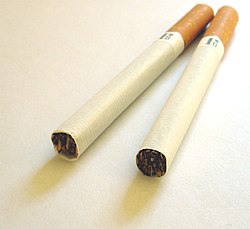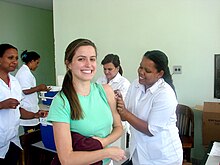 The National Autism Association responded firmly in regards to Bruesewitz v. Wyeth, in which the parents of Hannah Bruesewitz sued the Pfizer company, saying that its DTP vaccine caused her seizure disorder in 1992, and that the company knew it could produce a safer shot but chose not to. The Bruesewitzes took their claims to vaccine court first, but were denied, so they sued. They also recently lost this case in the Supreme Court.
The National Autism Association responded firmly in regards to Bruesewitz v. Wyeth, in which the parents of Hannah Bruesewitz sued the Pfizer company, saying that its DTP vaccine caused her seizure disorder in 1992, and that the company knew it could produce a safer shot but chose not to. The Bruesewitzes took their claims to vaccine court first, but were denied, so they sued. They also recently lost this case in the Supreme Court.
National Autism Association (NAA) board chair Lori McIlwain stated: "This ruling is a crushing blow not only to families struggling to provide care for their vaccine-injured children, but also to the rights of every US citizen. No other industry enjoys such complete protection from liability for harm caused to people injured by their products."
Nat'l Autism Assoc. Lashes Out Against Supreme Court DTP Vaccine Decision
NYC outdoor smoking extinguished from May 23
 Smoking in New York City's parks, beaches, boardwalks, pedestrian plazas and other public spaces will be banned from May 23 despite complaints about excessive meddling by government in people's private lives.
Smoking in New York City's parks, beaches, boardwalks, pedestrian plazas and other public spaces will be banned from May 23 despite complaints about excessive meddling by government in people's private lives.
Mayor Michael Bloomberg signed the legislation on Tuesday after the city council voted 36 to 12 in favour of the smoking restrictions earlier this month. The law extends the city's existing ban on smoking in restaurants and bars.
Cellphone Use Tied to Changes in Brain Activity
 Researchers from the National Institutes of Health have found that less than an hour of cellphone use can speed up brain activity in the area closest to the phone antenna, raising new questions about the health effects of low levels of radiation emitted from cellphones.
Researchers from the National Institutes of Health have found that less than an hour of cellphone use can speed up brain activity in the area closest to the phone antenna, raising new questions about the health effects of low levels of radiation emitted from cellphones.
The researchers, led by Dr. Nora D. Volkow, director of the National Institute on Drug Abuse, urged caution in interpreting the findings because it is not known whether the changes, which were seen in brain scans, have any meaningful effect on a person’s overall health.
Court rules against parents in drug vaccine case
 The Supreme Court ruled Tuesday that a federal law bars lawsuits against drug makers over serious side effects from childhood vaccines. By a 6-2 vote Tuesday, the court ruled against the parents of a child who sued the drug maker Wyeth in Pennsylvania state court for the health problems they say their daughter, now 19, suffered from a vaccine she received in infancy.
The Supreme Court ruled Tuesday that a federal law bars lawsuits against drug makers over serious side effects from childhood vaccines. By a 6-2 vote Tuesday, the court ruled against the parents of a child who sued the drug maker Wyeth in Pennsylvania state court for the health problems they say their daughter, now 19, suffered from a vaccine she received in infancy.
Justice Antonin Scalia, writing for the court, said Congress set up a special vaccine court to handle such claims as a way to provide compensation to injured children without driving drug manufacturers from the vaccine market. The idea, he said, was to create a no-fault system that spares the drug companies the costs of defending against parents' lawsuits.
Money Won’t Buy You Health Insurance
 This isn’t the story of a poor family with a mother who has a dreadful disease that bankrupts them, or with a child who has to go without vital medicines. Unlike many others, my family can afford medical care, with or without insurance. Instead, this is a story about how broken the market for health insurance is, even for those who are healthy and who are willing and able to pay for it.
This isn’t the story of a poor family with a mother who has a dreadful disease that bankrupts them, or with a child who has to go without vital medicines. Unlike many others, my family can afford medical care, with or without insurance. Instead, this is a story about how broken the market for health insurance is, even for those who are healthy and who are willing and able to pay for it.
Most employees assume that if they lose their job and the health coverage that comes along with it, they’ll be able to purchase insurance somewhere. The members of Congress who want to repeal the provision of last year’s health insurance law that makes it easier for individuals to buy coverage must assume that uninsured people do not want to buy it, or are just too cheap or too poor to do so.
Key breast cancer 'driver' gene found
 Cancer experts have identified a gene which can cause a particularly aggressive form of breast cancer to develop. ZNF703 is the first "oncogene" to be discovered in five years.
Cancer experts have identified a gene which can cause a particularly aggressive form of breast cancer to develop. ZNF703 is the first "oncogene" to be discovered in five years.
It is overactive in around one in 12 breast cancers, and could account for up to 4,000 UK cases a year. Cancer Research UK, whose scientists carried out the work, said the gene was a "prime candidate" for the development of new breast cancer drugs.
Consumer Group: Cola Coloring May Cause Cancer
 A consumer advocacy group says chemicals that give cola its distinctive caramel color may cause cancer. CBS News Medical Correspondent Dr. Jennifer Ashton explained on "The Early Show" that the Center for Science in Public Interest (CSPI) is concerned about a chemical that is liberated during the production process of making colas.
A consumer advocacy group says chemicals that give cola its distinctive caramel color may cause cancer. CBS News Medical Correspondent Dr. Jennifer Ashton explained on "The Early Show" that the Center for Science in Public Interest (CSPI) is concerned about a chemical that is liberated during the production process of making colas.
"They say (the chemical) has been found in government studies to cause cancer in animals. The State of California is so concerned about this that they have listed one of these ingredients on their list of substances known to cause cancer, and they want to limit the amount to no more than 16 micrograms a day," she said. "To put that into context for you, 20 ounces of cola can contain 12 times that amount."
More Articles...
Page 117 of 233

 Health Glance
Health Glance






























